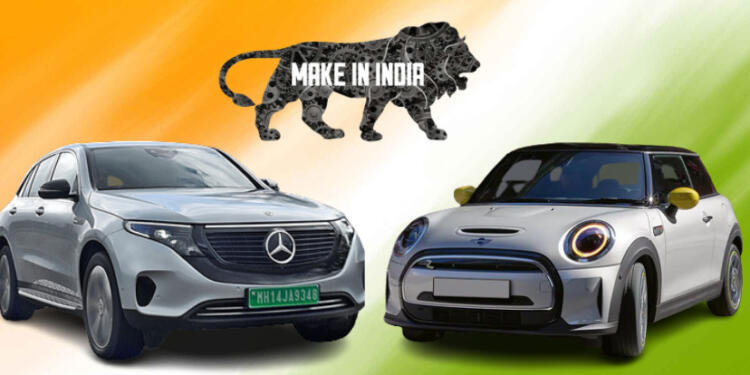The global automotive industry is going through a paradigm shift. The excessive reliance on fossil fuels for automobiles is extracting a huge cost instead of the environment. Thus, Electronic Vehicles (EVs) are dubbed as the future. However, a few years ago, India was not touted as the destination for the R&D, manufacturing, selling or export of EVs. The manufacturers did not have the incentives, the manufacturing policy and infrastructure were non-existent, and a lot of time was wasted in red-tapism.
But that is changing rapidly, and India is well on its path to becoming one of the largest EV markets by 2030. According to an independent study by CEEW Centre for Energy Finance (CEEW-CEF), the EV market in India will be a US$206 billion opportunity by 2030 if India maintains steady progress to meet its ambitious 2030 target.
While Tesla waits, cribs and calls the Indian government names, Mercedes, earlier this month announced that it will assemble its S-class equivalent EV here in India. The flagship EQS will also benefit from lowered prices, given that its assembly will take place locally at the brand’s plant in Chakan, Maharashtra.
Winding the clock a few years back and not many may have believed that such a feat would be possible. After all, S-class is one of the biggest shining jewels in Merc’s pack. It has served the company well for decades, despite the competitors trying to dislodge it, rather incessantly.
Giving incentives to the EV manufacturers
As reported by TFI, to encourage the traditional carmakers to foray into the EV sector, the Narendra Modi government last year launched multiple iterations of the Production Linked Incentive (PLI) scheme. The scheme worth Rs 26,000 crore will boost the production of electric vehicles and hydrogen fuel vehicles in the country.
This is the second PLI scheme in the sector as the government had earlier launched the scheme for Advanced Chemistry Cell (Rs 18,100 crore) and Faster Adaption of Manufacturing of Electric Vehicles (Rs 10,000 crore).
Moreover, in December, the government approved a Rs 76,000-Crore incentive scheme for semiconductors. Ever since the pandemic brought the world to a standstill, carmakers have had to delay the supply of cars due to a deficit of semiconductors.
Companies taking rightful advantage of Modi’s PLI scheme
Buoyed by the government’s US$3.5 billion PLI schemes, it appears that Ford may be returning to India to have a second crack. According to a Reuters report, Ford is mulling “exploring the possibility of using a plant in India as an export base for EV manufacturing.”
The U-turn from Ford comes at a time when the Modi government included the company in the list of 20 companies, selected to receive incentives under the PLI scheme for the Indian automotive sector.
Speaking about the developments, Ford India Head of Communications and CSR, Kapil Sharm remarked, “We thank the government of India for approving Ford’s proposal under the PLI scheme for the automobile sector. As Ford leads customers through the global electric-vehicle revolution, we’re exploring the possibility of using a plant in India as an export base for EV manufacturing,”
Earlier this week, on Thursday, automobile giant BMW launched its MINI Cooper SE – an all-electric vehicle in the Indian market. The pre-bookings had started last year and the car was reportedly sold out within minutes.
BMW expanding its footprint in the EV sector
BMW is bolstered by the response it has received in the car segment and is trying to emulate the same in the motorcycle segment. As reported by TFI, in December last year, BMW announced its partnership with India’s indigenous motor company TVS to develop EVs.
Under the partnership, Chennai headquartered TVS will be responsible for designing and developing future BMW Motorrad products as well as looking after supply chain management, and industrialization. The first product jointly developed by both the companies will be showcased rolled out of the assembly lines in the next two years.
Liberalising the EV norms
Earlier this month, in an attempt to create an efficient EV charging ecosystem, the Modi government allowed any individual or entity to set up public charging stations (PCS) without any licensing.
As reported by TFI, Bharat Petroleum Corporation Ltd. has already rolled out EV fast-charging corridors on the Chennai-Trichy-Madurai highway at ten of its fuel stations along the 900-kilometre route on both sides of the highway. BPCL is employing the services of CCS-2 DC fast-chargers, which makes the aforementioned stretch, the first EV-friendly highway in the country.
Read More: Bharat Petroleum Corporation Ltd. is solving India’s EV infrastructure crisis
Moreover, according to a TOI report, the decision cleared the way for EV owners to charge their vehicles at home or offices from existing connections at domestic tariffs. Liberalising the laws means that more electronic startups will venture into the field and set up charging stations.
The guidelines lay down the target of one PCS in every three-square-km grid in megacities and every 25 km on connecting highways in the next three years.
India’s story with EV has only just begun. With the government actively backing the companies and creating a self-sustaining manufacturing setup, capable of exporting to other countries as well – India is spearheading the EV revolution.




























